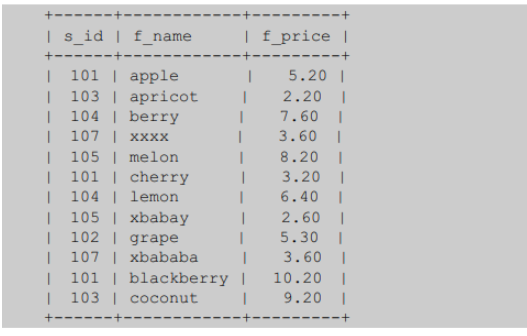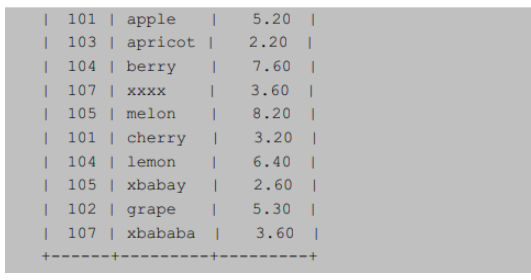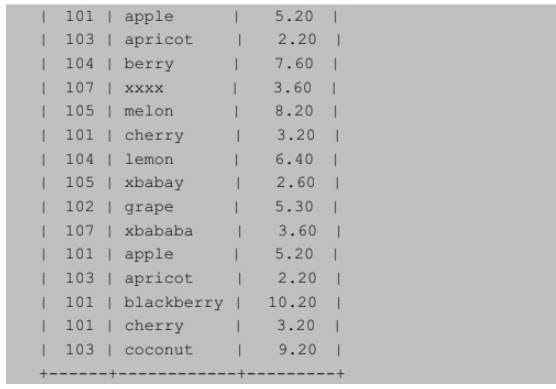How to merge query results in MySQL
Multiple SELECT statements can be combined into a single result set through the UNION keyword. When merging, the number of columns and data types corresponding to the two tables must be the same. Separate SELECT statements using the UNION or UNION ALL keyword. UNION does not use the keyword ALL, and duplicate records are deleted during execution, and all returned rows are unique; the function of using the keyword ALL is not to delete duplicate rows and not to automatically sort the results. The basic syntax format is as follows:
SELECT column,... FROM table1 UNION [ALL] SELECT column,... FROM table2
Query the information of all fruits with a price less than 9, query the information of all fruits with s_id equal to 101 and 103, use UNION to connect the query results, the SQL statement is as follows:
SELECT s_id, f_name, f_price FROM fruits WHERE f_price < 9.0 UNION SELECT s_id, f_name, f_price FROM fruits WHERE s_id IN(101,103);
The combined query results are as follows:

UNION combines the results of multiple SELECT statements into a single result set, as mentioned previously.. You can view the results of each SELECT statement separately:
SELECT s_id, f_name, f_price FROM fruits WHERE f_price < 9.0;

SELECT s_id, f_name, f_price FROM fruits WHERE s_id IN(101,103);

You can see from the results of separate queries that the first SELECT statement To query the fruits whose price is less than 9, the second SELECT statement queries the fruits provided by suppliers 101 and 103. Use UNION to separate two SELECT statements. After execution, combine the output results into a single result set and delete duplicate records.
In the previous example, due to the use of UNION ALL to contain duplicate rows, the same records were generated when querying separately. UNION automatically removes duplicate rows from the query result set. If you want to return all matching rows without deletion, you can use UNION ALL.
Query the information of all fruits with a price less than 9, query the information of all fruits with s_id equal to 101 and 103, use UNION ALL to connect the query results, the SQL statement is as follows:
SELECT s_id, f_name, f_price FROM fruits WHERE f_price < 9.0 UNION ALL SELECT s_id, f_name, f_price FROM fruits WHERE s_id IN(101,103);
The query results are as follows:

As you can see from the results, the total number of records here is equal to the sum of the number of records returned by the two SELECT statements. The connection query results do not remove duplicate rows.
Tip: The difference between UNION and UNION ALL: The function of using UNION ALL is not to delete duplicate rows, plus the ALL keyword statement requires less resources when executing, so use it as much as possible. Therefore, when you know that there are duplicate rows but want to keep these rows, and make sure that there will be no duplicate data in the query results or there is no need to remove duplicate data, you should use UNION ALL to improve query efficiency.
The above is the detailed content of How to merge query results in MySQL. For more information, please follow other related articles on the PHP Chinese website!

Hot AI Tools

Undresser.AI Undress
AI-powered app for creating realistic nude photos

AI Clothes Remover
Online AI tool for removing clothes from photos.

Undress AI Tool
Undress images for free

Clothoff.io
AI clothes remover

Video Face Swap
Swap faces in any video effortlessly with our completely free AI face swap tool!

Hot Article

Hot Tools

Notepad++7.3.1
Easy-to-use and free code editor

SublimeText3 Chinese version
Chinese version, very easy to use

Zend Studio 13.0.1
Powerful PHP integrated development environment

Dreamweaver CS6
Visual web development tools

SublimeText3 Mac version
God-level code editing software (SublimeText3)

Hot Topics
 MySQL: An Introduction to the World's Most Popular Database
Apr 12, 2025 am 12:18 AM
MySQL: An Introduction to the World's Most Popular Database
Apr 12, 2025 am 12:18 AM
MySQL is an open source relational database management system, mainly used to store and retrieve data quickly and reliably. Its working principle includes client requests, query resolution, execution of queries and return results. Examples of usage include creating tables, inserting and querying data, and advanced features such as JOIN operations. Common errors involve SQL syntax, data types, and permissions, and optimization suggestions include the use of indexes, optimized queries, and partitioning of tables.
 How to open phpmyadmin
Apr 10, 2025 pm 10:51 PM
How to open phpmyadmin
Apr 10, 2025 pm 10:51 PM
You can open phpMyAdmin through the following steps: 1. Log in to the website control panel; 2. Find and click the phpMyAdmin icon; 3. Enter MySQL credentials; 4. Click "Login".
 Why Use MySQL? Benefits and Advantages
Apr 12, 2025 am 12:17 AM
Why Use MySQL? Benefits and Advantages
Apr 12, 2025 am 12:17 AM
MySQL is chosen for its performance, reliability, ease of use, and community support. 1.MySQL provides efficient data storage and retrieval functions, supporting multiple data types and advanced query operations. 2. Adopt client-server architecture and multiple storage engines to support transaction and query optimization. 3. Easy to use, supports a variety of operating systems and programming languages. 4. Have strong community support and provide rich resources and solutions.
 MySQL's Place: Databases and Programming
Apr 13, 2025 am 12:18 AM
MySQL's Place: Databases and Programming
Apr 13, 2025 am 12:18 AM
MySQL's position in databases and programming is very important. It is an open source relational database management system that is widely used in various application scenarios. 1) MySQL provides efficient data storage, organization and retrieval functions, supporting Web, mobile and enterprise-level systems. 2) It uses a client-server architecture, supports multiple storage engines and index optimization. 3) Basic usages include creating tables and inserting data, and advanced usages involve multi-table JOINs and complex queries. 4) Frequently asked questions such as SQL syntax errors and performance issues can be debugged through the EXPLAIN command and slow query log. 5) Performance optimization methods include rational use of indexes, optimized query and use of caches. Best practices include using transactions and PreparedStatemen
 How to connect to the database of apache
Apr 13, 2025 pm 01:03 PM
How to connect to the database of apache
Apr 13, 2025 pm 01:03 PM
Apache connects to a database requires the following steps: Install the database driver. Configure the web.xml file to create a connection pool. Create a JDBC data source and specify the connection settings. Use the JDBC API to access the database from Java code, including getting connections, creating statements, binding parameters, executing queries or updates, and processing results.
 How to start mysql by docker
Apr 15, 2025 pm 12:09 PM
How to start mysql by docker
Apr 15, 2025 pm 12:09 PM
The process of starting MySQL in Docker consists of the following steps: Pull the MySQL image to create and start the container, set the root user password, and map the port verification connection Create the database and the user grants all permissions to the database
 MySQL's Role: Databases in Web Applications
Apr 17, 2025 am 12:23 AM
MySQL's Role: Databases in Web Applications
Apr 17, 2025 am 12:23 AM
The main role of MySQL in web applications is to store and manage data. 1.MySQL efficiently processes user information, product catalogs, transaction records and other data. 2. Through SQL query, developers can extract information from the database to generate dynamic content. 3.MySQL works based on the client-server model to ensure acceptable query speed.
 How to install mysql in centos7
Apr 14, 2025 pm 08:30 PM
How to install mysql in centos7
Apr 14, 2025 pm 08:30 PM
The key to installing MySQL elegantly is to add the official MySQL repository. The specific steps are as follows: Download the MySQL official GPG key to prevent phishing attacks. Add MySQL repository file: rpm -Uvh https://dev.mysql.com/get/mysql80-community-release-el7-3.noarch.rpm Update yum repository cache: yum update installation MySQL: yum install mysql-server startup MySQL service: systemctl start mysqld set up booting






